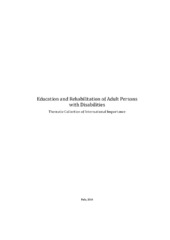Приказ основних података о документу
Cognitive processes in persons with intellectual disability as a factor of their participation in psychotherapy
| dc.contributor | Kulić Milan | |
| dc.contributor | Ilić–Stošović Danijela | |
| dc.creator | Stojković, Irena | |
| dc.creator | Dimoski, Sanja | |
| dc.date.accessioned | 2021-06-17T13:09:14Z | |
| dc.date.available | 2021-06-17T13:09:14Z | |
| dc.date.issued | 2014 | |
| dc.identifier.isbn | 978-99955-733-9-3 | |
| dc.identifier.uri | http://rfasper.fasper.bg.ac.rs/handle/123456789/2278 | |
| dc.description.abstract | This paper reviews research on cognitive processes in persons with intellectual disability (ID) as a prerequisite of the effective application of cognitive-behavioral therapy in treating mental disorders in these persons. This domain of investigation is important for the following reasons: persons with ID, according to the results of some studies, are at greater risk of developing mental disorders, in comparison to persons from the general population; the efficacy of cognitive-behavioral therapy in treating mental disorders in persons without ID has been empirically supported; there is some evidence that this psychotherapy may be effective in persons with ID. Cognitive behavioral therapy aims to treat emotional problems by using various techniques which lead to changes in false cognitions and, as a consequence, to changes in dysfunctional emotions and behavior. In this work we present empirical findings on the following cognitive processes and abilities in persons with ID: verbal abilities; self-concept; metacognition; recognition and labeling of emotions; linking events and emotions; discriminating thoughts, feelings and behavior; understanding the mediating role of cognition in the relationship between situations and emotional and behavioral responses. Research suggests that persons with mild and moderate ID are capable to discriminate and label various emotions, and to link events and emotions, but that they have significant difficulties in understanding the mediating role of cognitions in emotional problems. Further, persons with ID have constraints in verbal abilities and in metacognition which impose difficulties on their participation in psychotherapy. However, several authors express the opinion that it is possible to work on the development of cognitive abilities which are required for the application of the cognitive-behavioral approach, and that this work may be a part of psychotherapy. | |
| dc.language | en | |
| dc.publisher | University of East Sarajevo, Faculty of Medicine; University of Belgrade – Faculty of Special Education and Rehabilitation | |
| dc.relation | info:eu-repo/grantAgreement/MESTD/Integrated and Interdisciplinary Research (IIR or III)/47015/RS// | |
| dc.rights | openAccess | |
| dc.rights.uri | https://creativecommons.org/licenses/by-sa/4.0/ | |
| dc.source | Thematic Collection of International Importance- „Education and Rehabilitation of Adult Persons with Disabilities “, Foča, Bosna I Hercegovina, 2014. | |
| dc.subject | cognitive processes | |
| dc.subject | cognitive functioning | |
| dc.subject | cognitive abilities | |
| dc.subject | intellectual disability | |
| dc.subject | cognitive-behavioral psychotherapy | |
| dc.title | Cognitive processes in persons with intellectual disability as a factor of their participation in psychotherapy | en |
| dc.type | conferenceObject | |
| dc.rights.license | BY-SA | |
| dc.citation.epage | 138 | |
| dc.citation.other | : 125-138 | |
| dc.citation.spage | 125 | |
| dc.identifier.fulltext | http://rfasper.fasper.bg.ac.rs/bitstream/id/6754/bitstream_6754.pdf | |
| dc.identifier.rcub | https://hdl.handle.net/21.15107/rcub_rfasper_2278 | |
| dc.type.version | publishedVersion |


